San Francisco International Film Festival: Capsules

Cargo (2009, Dir. Ivan Engler & Ralph Etter)
Purportedly Switzerland's first science fiction filmand made on a shoestring budget, Cargo is certainly an impressive technical effort (some of of the outer space effects are bit too CGI-flat, but most of the others have a lovely simplicity). The story itself begins as a haunted, hushed study of a lonely space traveler (the appealing Anna Katharina Schwabroh) as she signs on for a tour of duty as doctor on a grungy interstellar freighter, but naturally not all is as it seems. It leads to plot developments that are about equal parts Alien, The Matrix and Solaris, a bit too derivative and undercooked to truly stand on its own, but the acting is uniformly fine and the film doesn't overstay its welcome.

Cold Weather (2010, Dir. Aaron Katz)
My first exposure to the "mumblecore" genre. Comedy-cum-mystery centers on the unambitious Doug (Cris Lankenau, a brainier Jessie Eisenberg), who has forsaken getting a degree in forensic science in Chicago to crash with his acerbic sister (Trieste Kelly Dunn) in Portland and work in a local ice factory. When an old flame shows up and then vanishes, it's up to Doug to play Sherlock (he's a big Conan Doyle fan) and figure out what's happening. Touching on noir conventions (a man called "the cowboy," pornography rings, misappropriated cash), the film has an agreeable shambling pace and some nice deadpan zingers in the dialogue, plus some striking photography of the Pacific Northwest courtesy of Andrew Reed. The mystery plot comes to an underwhelming finish just as it starts cooking, but the final scene of conciliation over a cassette mix tape sticks in the memory.
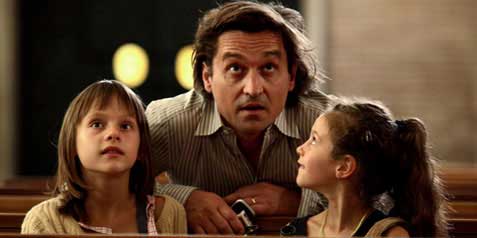
Father of My Children (2009, Dir. Mia Hansen-Love)
Up-and-coming director Mia Hansen-Love apparently based this film on a famous French producer who committed suicide (sorry, spoiler there). The film splits into two, with the first half following increasingly harried and despairing producer Gregoire (Louis-Do de Lencquesaing), and the second his grieving family, including his wife (Chiara Caselli) and eldest daughter Clemence (Alice de
Lencquesaing
). As you might expect, things head to a que serra serra conclusion, minus the Hollywood tearjerker histrionics. Maybe it's too tasteful -- apart from Clemence's side story of bitterness and acceptance (perhaps not surprisingly since the character is the closest to director Hansen-Love in age), everything plays out on an even (flatlined?) keel. Still, the children are adorable and the digs at the French film industry (including a Lars von Trier-type) are just snarky enough to maintain one's interest.
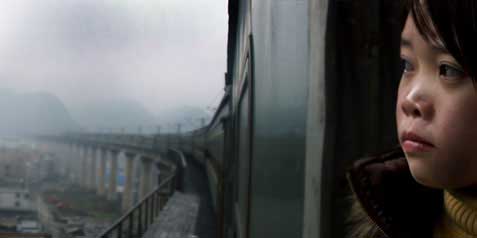
Last Train Home (2009, Dir. Lixin Fan)
"You want to film the real me? This is the real me!" It's a line out of a reality TV show, but the reality depicted in this documentary cuts deep, as we witness the travails of a Chinese family named the Zhangs over a period of three years. The parents spend virtually the entire time on the other side of the country working for pennies in a garment factory to support their dream of putting their kids through college. Every Chinese New Year they make the near-impossible train ride home to visit their children and remind them that they must do better than them when they grow up. (Having survived the Guangzhou train crush myself, the footage of crowds seemingly bunched for miles around the station, waiting for a slim chance to return home, brought back vivid memories for me.) It all goes painfully awry for the Zhangs when Qin decides she wants to forsake school, become a migrant worker herself, and take the "new way" to success and fortune. Qin's climactic outburst (the quote above) and director Lixin Fan's unsparing eye throughout is riveting.
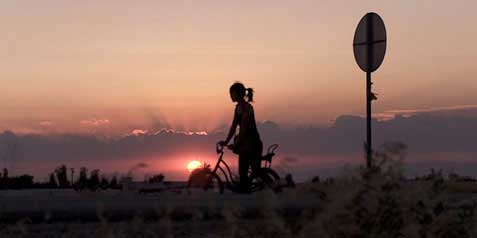
Littlerock (2010, Dir. Mike Ott)
An absorbing film from a fresh filmmaker, and one of my favorites from the festival. The setup is simple: brother and sister Rintaro and Atsuko (Rintaro Sawamoto, Atsuko Okatsuka) are road-tripping through central California when their car breaks down in the titular town. Rintaro senses the dead-end nature of the place and is raring to keep going, but Atsuko falls in with her surroundings and gets mixed up in an almost-love-affair with the dorky artist-wannabe Cory (Cory Zacharia, who basically steals the show). Not a whole lot happens in the movie, but director Ott gets plenty of mileage out of his characters' shifting perceptions and emotions, easily sidestepping cliche (for example, Cory runs afoul of the local loan shark, but the side-plot doesn't resolve the way you think it might). Throughout one gets the sense of dislocation and lack of connection, but also possibilities for fleeting moments of companionship if not necessarily understanding. A final phone call conducted in Japanese and English puts a nice bittersweet capper on the affair.
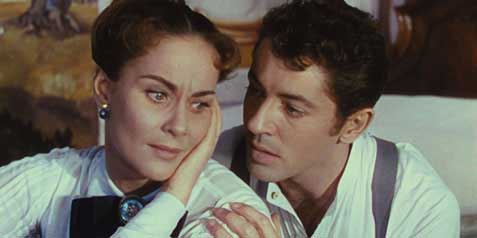
Senso (1954, Dir. Luchino Visconti)
Reprint of the classic Visconiti film. Melodramatic? Sure. Gaudy? You bet. Shocking in its emotional realism? Yes. Alida Valli practically trembles with pent-up emotions as an Italian countess who gets involved with an officer from the occupying Austrian army (Farley Granger) in the 1860s, their frothy affair growing ever more forlorn and coarse as it follows the fortunes of the war. Backed by swelling music by Bruckner and Verdi, and set in sumptuous opera houses and sprawling rustic farmlands, the lovers' story reaches grandiose proportions of loss and betrayal before it is all but swallowed up by the grim realities of the ongoing conflict, the concluding shot of an execution as hauntingly matter-of-fact and final as a blade coming down. They truly don't make 'em like these any more.
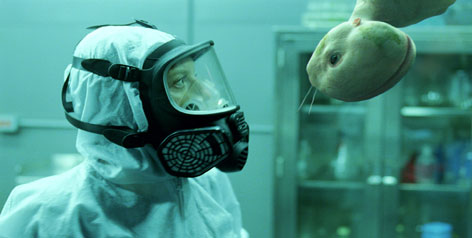
Splice (2010, Dir. Vincenzo Natali)
Almost venturing all the way into Grand Guignol David Cronenberg territory, this horror-thriller about genetic manipulation is more intelligent than most in the genre, and features a striking performance by Delphine Chaneac as the artificially created being who blossoms before its makers' (Sarah Polley and Adrien Brody) eyes, with unexpected results. For a while the steely build-up of the narrative keeps us engrossed, with just enough humor thrown in to leaven the tension, but by the final reel and a seduction scene that will either leave you shaking your head or laughing in disbelief, the tone veers off wildly, culminating in a less-than-thrilling finale and a denouement about the depersonalization of corporate life that is well taken, but not necessarily fresh.
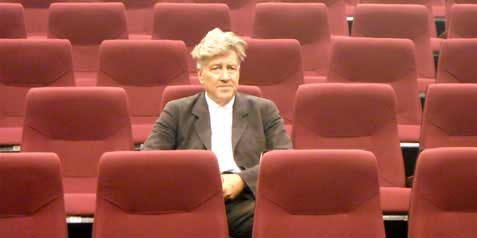
Transcending Lynch (2010, Dir. Marcos Andrade)
Pseudo-documentary of David Lynch's book tour through Brazil is really an infomercial for transcendental meditation (Lynch's pet religion). This doesn't necessarily sabotage the project, but director Marcos Andrade's ham-fisted direction does. Want to see interminable footage of fawning Lynch fans waiting to get his autograph? (Hey, I don't blame them, I'd be pretty stoked too -- I blame Andrade's editor.) How about Lynch's musings on "catching the big fish" when it comes to artistic inspiration -- the same shtick he's used in interviews for decades now? How about a near-creepy passage in which Lynch addresses hundreds of kids in transcendental school and tells them they're the hope for the future? Scientology, eat your heart out.

Vengeance (2009, Dir. Johnnie To)
You have to hand it to Johnnie To -- he's been doing variations on the old-school Hong Kong thriller for years, and he still finds ways to keep things interesting. This time out it's a plot strand borrowed from Memento (a man out for revenge is losing his memory), tossed in with the cool men-on-a-mission vibe from The Mission. Former French heartthrob Johnny Hallyday projects dry-as-leather authority as the man out to avenge his daughter before a bullet in his brain renders him a complete amnesiac, and as usual, Anthony Wong is a showstopper as the leader of the hit squad that Hallyday recruits to help him. Throw in some nifty setpieces (a roving shootout through downtown Macau, a battle royale in a delapidated junkyard) and absurdist bits of humor (an ex-moll who is now very pregnant dolls herself up to seduce one of the baddies), and you have another worthy entry in the To catalogue, even if it lacks the revelatory staying power of Running on Karma or Fulltime Killer.
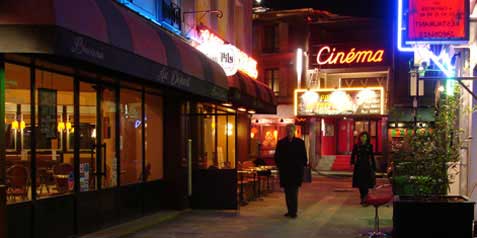
Wild Grass (2009, Dir. Alain Renais)
Alain Renais' latest is a frothy concoction. What plot there is concerns a dentist with shocking red hair who also happens to be an amateur aviatrix (Sabine Azema), and the lonely, addled man who finds her wallet (Andre Dussolier). What should be a simple thank-you call turns into an off-kilter tale of obsession and obligation that flirts with the possibility of becoming a thriller (the man has some criminal activity in his background which is never elaborated upon), a romantic comedy (including missed connections, befuddled cops and face-downs between a wife and a mistress), or an existential drama (no surprise given that Renais helmed Last Year at Marienbad), all voice-overed by an all-seeing narrator who may also happen to be the scruffy mechanic at the local airfield. By the time someone's pants zipper gets stuck, leading to a crazy accident and a concluding scene that is seemingly out of nowhere, you may throw up your hands and give up, or you can take the movie's title as a clue and appreciate the random bits of beauty and strangeness that Renais throws at you, like fertile ground blooming in all directions.
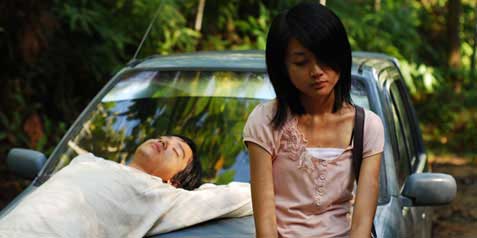
Woman on Fire Looks for Water (2009, Dir. Woo Ming-jin)
As you'd expect from a film about fisherman in the sleepy village of Kuala Selangor in Malaysia , this film has a slow (some would say funereal) pace. It's all about love or lack thereof as fisherman Ah-Fei (Ernest Chong) pursues the hard-to-get Lily (Foo Fei-ling), while his father Ah-Kau (Chung Kok-keong) gets involved once again with the love of his life, who has moved on to marry a richer man. The delicacy of these stories is juxtaposed with the realities of the characters' environment, where working at a shellfish factory may mean the difference between gaining the woman of your dream's hand or never having enough money to skate by. There are some nice comic touches (Ah-Kau's rival for his ex-love's attentions refuses to believe he's even worthy of being a rival, and Ah-Fei gets sandbagged into a possible arranged relationship with the daughter of a local fish factory magnate), and some oblique storytelling as well (the fate of Ah-Kau is implied but never completely spelled out). Woman on Fire isn't for everyone's taste, but it'll satisfy those in the mood for a languorous, delicate piece.

Yellow Sheep River (2009, Dir. Liu Soung)
A political documentary this ain't, but this steady, engrossing, nearly wordless look at the life of farmers in distant, impoverished Gansu province is an intimate portrait of the rural life in China. We follow various families as they go through their rituals -- harvesting, transporting their crops, visiting relatives, going to school, or just hanging out -- and these rituals generate their own hypnotic power. Some of the soundtrack gets a bit heavy-handed on the Western-style strings, but the folk songs (courtesy of blind musician Chen Kai-yo) are stirring, and the cinematography is attentive to the details of a grain harvest, or the unabashed joy on the faces of kids as they run down the hill to school. More than just a mood piece, it's a tribute to a way of life that just may continue to persevere through economic and political changes.
Labels: alain renais, david lynch, johnnie to, luchino visconti, mike ott, san francisco international film festival, senso, splice

